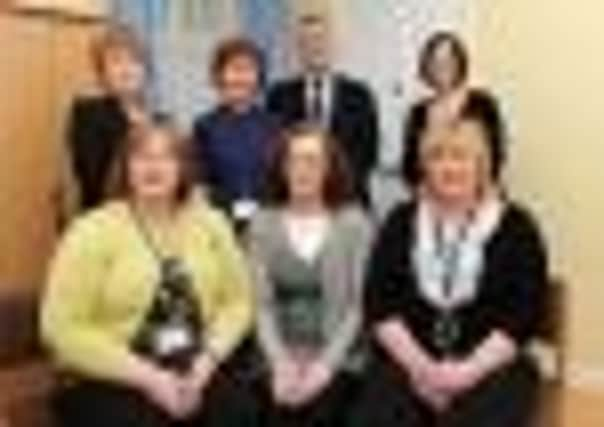Gone but never forgotten – life after tragedy of a baby’s death


IT might be more than 25 years since Sheryl McMahon’s baby Alison died, but the hurt is still strong.
“Everything had been fine with my pregnancy but she went into distress during labour. She had inhaled meconium and although they tried to save her she died in my arms aged 27 hours,” explains Sheryl.
Advertisement
Hide AdAdvertisement
Hide Ad“We were able to spend some time with her in the chapel before she was taken for a post mortem and a doctor brought a camera. At the time I remember thinking why on earth does he want me to take pictures of my dead baby, but now they are the most precious things to me. They are all I really have of Alison.”
For Sheryl to be able to spend some time alone with her baby was an important part of her grieving process.
“It gave me time to say goodbye, although I would have liked longer with her. To walk out of that hospital with nothing when you had been expecting to leave with a healthy baby is devastating.”
Sheryl had a three-year-old at home and so she says she had to get on with life and come to terms with Alison’s death quite quickly.
Advertisement
Hide AdAdvertisement
Hide AdShe says she gained a lot of help and support from talking to volunteers from the Stillbirth and Neonatal Death charity (SANDS) after Alison’s death.
“I just needed someone to talk to. I contacted SANDS and they put me in touch with a befriender. It was just such a relief to talk to other people who had been through the same thing. You feel like you are the only woman in the world going through it. She just let me talk about Alison as much as I wanted to.”
Although she talked to the befriender on a regular basis, Sheryl says life was busy and she had to get on with life.
Then 13 years after Alison died Sheryl gave birth to a son.
“I had been quite worried during the pregnancy as I was aware that things can go wrong.”
Advertisement
Hide AdAdvertisement
Hide AdShe had a planned Caesarean section and all went well, but it was after Jacob was born that it really hit Sheryl.
“It just hit me like a brick. I realised just what I had missed out on with Alison. I was very over-protective of Jacob. I knew it wasn’t right and I realised that it was grief coming back, although it never really went away.”
She had support from family and friends but she had never met anyone else face-to-face who had lost a baby in similar circumstances.
“I got in touch with my befriender again and she was like a life-saver.
Advertisement
Hide AdAdvertisement
Hide Ad“She listened to me talking about Alison. She is still my baby. People just don’t understand.
“They are kind but they feel awkward when you want to talk about your dead baby and show photographs. That is why SANDS is so important.”
Sheryl plucked up the courage to visit one of SANDS’ support groups. “I cried with sheer relief. I felt normal being amongst other people just like me.”
After moving up to Yorkshire from her native West Midlands Sheryl decided she wanted to do something for SANDS.
Advertisement
Hide AdAdvertisement
Hide Ad“I wanted to give something back.” Sheryl is now chair of the Leeds SANDS and also one of just eight trustees of the national charity.
As well as helping people deal with their grief and talk about their dead babies, Sheryl and the Leeds branch of SANDS raise funds.
“We would like to see full-time bereavement midwives in all hospitals, but at the moment it varies from hospital to hospital.
“We also run training sessions for midwives.”
Most recently the Leeds branch of SANDS raised money to buy two specially designed Medecool units for the Rosemary Bereavement Suite at Leeds General Infirmary and the Snowdrop Bereavement suite at St James’ Hospital.
Advertisement
Hide AdAdvertisement
Hide AdThe units provide grieving parents the opportunity to spend more precious moments with their dead babies at the hospital.
“I know how important it is to have that extra time with your baby, especially in the years to come,” says Sheryl.
STILLBIRTH STATISTICS
• 17 babies die every day in the UK (10 are stillbirths, seven are neonatal deaths) – almost 6,500 baby deaths a year.
• Ten times more babies are stillborn than die of cot death every year in the UK.
Advertisement
Hide AdAdvertisement
Hide Ad• The stillbirth rate has remained almost unchanged for the past 10 years.
• One in every 200 babies is stillborn in the UK.
• One in every 300 babies born in the UK die in the first four weeks of life.
• One in four stillbirths remains unexplained.
• One in five stillborn babies are much smaller than they should be.
• www.uk-sands.org Helpline 02074365881.